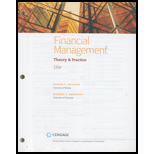
Case summary:
He has asked you, the firm’s most recently hired financial analyst, to develop a 1-hour tutorial package that explains the basics of multinational
To discuss: The
Want to see the full answer?
Check out a sample textbook solution
Chapter 17 Solutions
FINANCIAL MANAGEMENT(LL)-TEXT
- Which of the following bonds offers the highest current yield? a. A(n) 3.78%, 19-year bond quoted at 38.893. b. A(n) 6.30%, 28-year bond quoted at 64.822. c. A(n) 1.89%, 23-year bond quoted at 19.447. The current yield of the bond in part a is ☐ %. (Round to two decimal places.) ...arrow_forwardExplain working capital? explain.arrow_forwardYou have the opportunity to purchase a 24-year, $1,000 par value bond that has an annual coupon rate of 11%. If you require a YTM of 7.7%, how much is the bond worth to you? The price of the bond is $ ☐ . (Round to the nearest cent.)arrow_forward
- You are considering investing $880 in Higgs B. Technology Inc. You can buy common stock at $25.88 per share; this stock pays no dividends. You can also buy a convertible bond ($1,000 par value) that is currently trading at $880 and has a conversion ratio of 30. It pays $52 per year in interest. If you expect the price of the stock to rise to $36.72 per share in one year, which instrument should you purchase? The holding period return on the purchase of the common stock would be %. (Round to two decimal places.)arrow_forwardHow can you determine the value/worth of a company?arrow_forwardQ9. What do you understand about RAROC?arrow_forward
- Need assistance in this question no ai.arrow_forwardI need solution help by real expert and true answer.arrow_forwardAn investor is in the 24% tax bracket and lives in a state with no income tax. He is trying to decide which of two bonds to purchase. One is a(n) 9.03% corporate bond that is selling at par. The other is a municipal bond with a 6.44% coupon that is also selling at par. If all other features of these two bonds are comparable, which should the investor select? Why? Would your answer change if this were an in-state municipal bond and the investor lived in a place with high state income taxes? Explain. O A. The investor should select the corporate bond. Since the fully taxable equivalent yield of 8.47% is less than the 9.03% return on the corporate bond, the corporate issue offers a higher return and is the better buy. The decision very likely would change if this were an "in-state" municipal bond and the investor lived in a state with high income taxes. An "in-state" municipal bond would not only shield the investor from federal taxes but also from high state income taxes. OB. The…arrow_forward
 Intermediate Financial Management (MindTap Course...FinanceISBN:9781337395083Author:Eugene F. Brigham, Phillip R. DavesPublisher:Cengage Learning
Intermediate Financial Management (MindTap Course...FinanceISBN:9781337395083Author:Eugene F. Brigham, Phillip R. DavesPublisher:Cengage Learning


